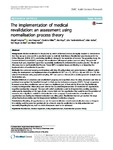The implementation of medical revalidation: an assessment using normalisation process theory
| dc.contributor.author | Archer, Julian | |
| dc.date.accessioned | 2017-12-01T13:01:23Z | |
| dc.date.available | 2017-12-01T13:01:23Z | |
| dc.date.issued | 2017-11-21 | |
| dc.identifier.issn | 1472-6963 | |
| dc.identifier.issn | 1472-6963 | |
| dc.identifier.other | 749 | |
| dc.identifier.uri | http://hdl.handle.net/10026.1/10357 | |
| dc.description.abstract |
BACKGROUND: Medical revalidation is the process by which all licensed doctors are legally required to demonstrate that they are up to date and fit to practise in order to maintain their licence. Revalidation was introduced in the United Kingdom (UK) in 2012, constituting significant change in the regulation of doctors. The governing body, the General Medical Council (GMC), envisages that revalidation will improve patient care and safety. This potential however is, in part, dependent upon how successfully revalidation is embedded into routine practice. The aim of this study was to use Normalisation Process Theory (NPT) to explore issues contributing to or impeding the implementation of revalidation in practice. METHODS: We conducted seventy-one interviews with sixty UK policymakers and senior leaders at different points during the development and implementation of revalidation: in 2011 (n = 31), 2013 (n = 26) and 2015 (n = 14). We selected interviewees using purposeful sampling. NPT was used as a framework to enable systematic analysis across the interview sets. RESULTS: Initial lack of consensus over revalidation's purpose, and scepticism about its value, decreased over time as participants recognised the benefits it brought to their practice (coherence category of NPT). Though acceptance increased across time, revalidation was not seen as a legitimate part of their role by all doctors. Key individuals, notably the Responsible Officer (RO), were vital for the successful implementation of revalidation in organisations (cognitive participation category). The ease with which revalidation could be integrated into working practices varied greatly depending on the type of role a doctor held and the organisation they work for and the provision of resources was a significant variable in this (collective action category). Formal evaluation of revalidation in organisations was lacking but informal evaluation was taking place. Revalidation had not yet reached the stage where feedback was being used for improvement (reflexive monitoring category). CONCLUSIONS: Requiring all organisations to use the same revalidation model made revalidation easy to integrate into existing work for some but problematic for others. In order for revalidation to be fully embedded and successful, impeding factors, such as a lack of resources, need to be addressed. | |
| dc.format.extent | 749- | |
| dc.format.medium | Electronic | |
| dc.language | en | |
| dc.language.iso | en | |
| dc.publisher | BioMed Central | |
| dc.subject | Revalidation | |
| dc.subject | Medical regulation | |
| dc.subject | Policy implementation | |
| dc.subject | Normalisation process theory | |
| dc.title | The implementation of medical revalidation: an assessment using normalisation process theory | |
| dc.type | journal-article | |
| dc.type | Journal Article | |
| plymouth.author-url | https://www.webofscience.com/api/gateway?GWVersion=2&SrcApp=PARTNER_APP&SrcAuth=LinksAMR&KeyUT=WOS:000416044100004&DestLinkType=FullRecord&DestApp=ALL_WOS&UsrCustomerID=11bb513d99f797142bcfeffcc58ea008 | |
| plymouth.issue | 1 | |
| plymouth.volume | 17 | |
| plymouth.publication-status | Published | |
| plymouth.journal | BMC Health Services Research | |
| dc.identifier.doi | 10.1186/s12913-017-2710-5 | |
| plymouth.organisational-group | /Plymouth | |
| plymouth.organisational-group | /Plymouth/Faculty of Health | |
| plymouth.organisational-group | /Plymouth/Faculty of Health/Peninsula Medical School | |
| plymouth.organisational-group | /Plymouth/REF 2021 Researchers by UoA | |
| plymouth.organisational-group | /Plymouth/REF 2021 Researchers by UoA/UoA23 Education | |
| plymouth.organisational-group | /Plymouth/Research Groups | |
| plymouth.organisational-group | /Plymouth/Research Groups/FoH - Community and Primary Care | |
| plymouth.organisational-group | /Plymouth/Users by role | |
| plymouth.organisational-group | /Plymouth/Users by role/Academics | |
| dc.publisher.place | England | |
| dcterms.dateAccepted | 2017-11-07 | |
| dc.identifier.eissn | 1472-6963 | |
| dc.rights.embargoperiod | Not known | |
| rioxxterms.versionofrecord | 10.1186/s12913-017-2710-5 | |
| rioxxterms.licenseref.uri | http://www.rioxx.net/licenses/all-rights-reserved | |
| rioxxterms.licenseref.startdate | 2017-11-21 | |
| rioxxterms.type | Journal Article/Review |


